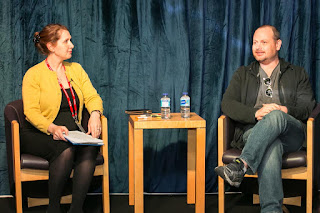Imagine a woman. She is twenty-five: an arresting Jewish beauty with thick chestnut hair and restless, toffee-coloured eyes. She has been married since the age of eighteen. Her husband is a respectable man of means. She is a mother with a five-year-old child. The place is Melbourne, the year 1905. All seems well.
But this is the moment when everything changes.
The woman leaves, abandoning both her husband and her daughter. Even worse, she runs away with a handsome half-Chinese fortune-teller called Zeno the Magnificent.
 |
| Alexandra Joel |
He claims to be a distinguished Japanese Professor, she decides it would be rather smart to be American. Leading members of the British aristocracy and European royalty are bewitched by her and fall, willing captives to her spell.
She sounds like an invention, a character from a fairy tale. But she is not. This astonishing woman lived. Her name is Rosetta and she was my great-grandmother.
Rosetta created an extraordinary life.
She took great risks and ignored almost all of society’s constraints, while at the same time forging intimate relationships with lords, ladies, and the heirs to several European thrones. But, after she ran away with Zeno, she never saw her child again.
I have always known that my great-grandmother did a dreadful thing. It must have been when I was very young that I was first told she had deserted her only child. This alarming knowledge – some mothers simply chose to disappear – became a part of the child I was, my identity.
What I did not know was how such a calamity had come about. Where had my errant great-grandmother gone, and why?
No doubt even in the far-off 1950s, when children were not encouraged to be forthcoming but, rather, to know their place, many were braver than I was, asked more questions, demanded answers in response. I did not.

I don’t believe it was simple timidity that caused my questions to remain unspoken; it had something more to do with the risk I sensed. Perhaps all families have secret, bruised place to which one journeys at one’s peril. I was a child, yet still I understood the way in which a misplaced query might disturb these tender realms.
Even after the details of Rosetta’s remarkable life had, finally, been revealed, it was many years before I began to write this book.
I was too conflicted: one part of me marvelled at her courage, her defiance of convention and brilliant ability to invent an existence as improbable as it way thrilling. But the other part – darker, more turbulent - was furious. A single question resounded in my mind: ‘How could you leave your child?’
Eventually, I found this question impossible to ignore. Conversations might be avoided and thoughts suppressed, but feelings have a way of working their way through the line and texture of one’s being. And there was something else. It was a kind of insistence, as if Rosetta herself were demanding to be brought back to life.
Despite all my misgivings, I went in search of her. Like so many before me, I too had fallen beneath her spell.
Alexandra Joel will be talking about how knowing one's family history can help to make sense of the past but also affect the present in the session 'Inheriting the past - family legacies', alongside Shelley Davidow, moderated by Michaela Kalowski, on Sunday August 28, 11:15am - 12:15pm at the Sydney Jewish Writers Festival.
Book today at www.sjwf.org.au!















